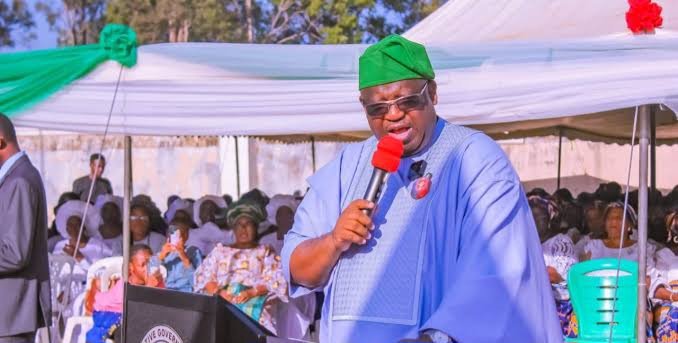
Rise To Defend Yourselves: Plateau Governor Mutfwang Urges Bereaved Communities Amid Rising Violence

In a heartfelt address to the residents of Zilkke village in Plateau State’s Bassa Local Government Area, Governor Caleb Mutfwang called on the community to take a stand and protect themselves following a devastating attack on the night of Sunday, April 13, 2025.
The violent assault, which claimed over 50 lives, left numerous individuals—many of them women and children—injured, and saw more than 40 homes reduced to ashes, marked yet another tragic chapter in the region’s escalating security crisis.
This latest incident comes on the heels of a similar attack just two weeks prior in Bokkos Local Government Area, where over 80 people were killed, underscoring the persistent threat faced by communities in Plateau State.
Governor Mutfwang visited the affected village on Tuesday, April 15, 2025, to assess the situation firsthand.
Speaking to survivors who had sought refuge in a local primary school, he emphasized the urgent need for communal vigilance and self-defense while cautioning against retaliatory violence that could further inflame tensions. “We are more determined than ever to ensure that no more innocent blood is shed on the Plateau,” Mutfwang declared.
He stressed that while his administration continues to bolster security measures, the responsibility of safeguarding their lives and properties also falls on the communities themselves. “Communities must rise to defend themselves,” he urged, particularly as the farming season approaches—a time when rural areas often become more vulnerable to attacks.
The governor’s remarks come amid a backdrop of deep-rooted ethnic and religious tensions in Plateau State, a region long plagued by clashes between predominantly Christian farming communities and mainly Muslim Fulani herders.
Local residents of Zilkke have pointed fingers at Fulani militants, alleging their involvement in the recent attack.
However, Ardo Lawal Haruna, a Fulani leader in the area, has strongly denied these accusations, condemning the violence and calling on security agencies to thoroughly investigate and bring the true culprits to justice.
The Irigwe Development Association’s spokesperson, Samuel Jugo, confirmed that the assault began with sporadic gunfire by unidentified assailants, adding to the uncertainty surrounding the attackers’ identities.
This wave of violence is part of a broader crisis gripping Plateau State and other parts of Nigeria’s Middle Belt. Reports from Christian Solidarity Worldwide (CSW) highlight the scale of the tragedy, noting that between December 24 and 25, 2024, coordinated attacks by Fulani militia in Bokkos and Barkin-Ladi LGAs resulted in 148 to 195 deaths, alongside the destruction of 221 homes and the displacement of over 10,000 people.
These incidents are not isolated but part of a long-standing pattern of violence often linked to disputes over land, grazing rights, and ethnic differences, exacerbated by climate change and resource scarcity.
The broader context of religious persecution in Nigeria adds another layer of complexity.
According to data cited on Wikipedia, approximately 62,000 Nigerian Christians have been killed since 2000 by various groups, including Boko Haram and Fulani herdsmen, in what some have described as a "silent genocide."
Governor Mutfwang’s call for self-defense reflects the desperation felt by many communities who feel abandoned by a government struggling to curb the violence.
While he reassured residents of his administration’s commitment to rebuilding and supporting displaced families, the recurring nature of these attacks has left many questioning the effectiveness of current security measures.
Adding to the voices for peace, the traditional ruler of the Irigwe people, Bra Ngwe Irigwe, Rt. Rev. Ronku Aka, expressed gratitude for the governor’s visit and echoed the call for restraint, urging residents to avoid reprisals despite what he believes are targeted efforts to displace his people.
Meanwhile, Mutfwang has taken to social media to update the public, stating that a high-level security meeting was convened to address the crisis and prevent further bloodshed.
As Plateau State grapples with this ongoing tragedy, the governor’s words serve as both a rallying cry for resilience and a stark reminder of the challenges that lie ahead in restoring peace to the region.


